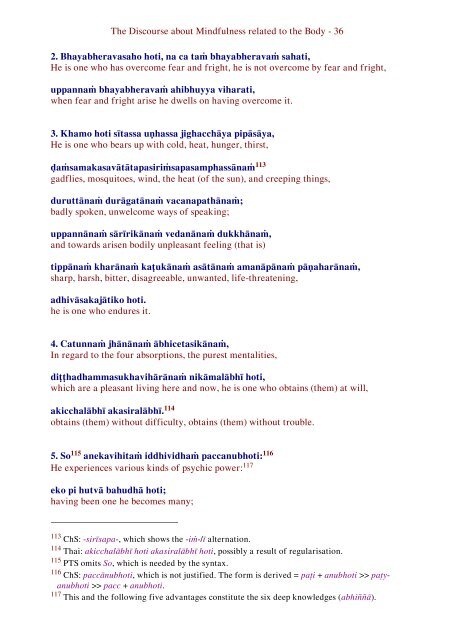Kayagatasatisuttam, the Discourse about Mindfulness related to the Body
A Pāli and English line by line (interlinear) version of this important discourse about the development of various meditations related to the body (together with extensive annotation).
A Pāli and English line by line (interlinear) version of this important discourse about the development of various meditations related to the body (together with extensive annotation).
Create successful ePaper yourself
Turn your PDF publications into a flip-book with our unique Google optimized e-Paper software.
The <strong>Discourse</strong> <strong>about</strong> <strong>Mindfulness</strong> <strong>related</strong> <strong>to</strong> <strong>the</strong> <strong>Body</strong> - 36<br />
2. Bhayabheravasaho hoti, na ca taṁ bhayabheravaṁ sahati,<br />
He is one who has overcome fear and fright, he is not overcome by fear and fright,<br />
uppannaṁ bhayabheravaṁ ahibhuyya viharati,<br />
when fear and fright arise he dwells on having overcome it.<br />
3. Khamo hoti sītassa uṇhassa jighacchāya pipāsāya,<br />
He is one who bears up with cold, heat, hunger, thirst,<br />
ḍaṁsamakasavātātapasiriṁsapasamphassānaṁ 113<br />
gadflies, mosqui<strong>to</strong>es, wind, <strong>the</strong> heat (of <strong>the</strong> sun), and creeping things,<br />
duruttānaṁ durāgatānaṁ vacanapathānaṁ;<br />
badly spoken, unwelcome ways of speaking;<br />
uppannānaṁ sārīrikānaṁ vedanānaṁ dukkhānaṁ,<br />
and <strong>to</strong>wards arisen bodily unpleasant feeling (that is)<br />
tippānaṁ kharānaṁ kaṭukānaṁ asātānaṁ amanāpānaṁ pāṇaharānaṁ,<br />
sharp, harsh, bitter, disagreeable, unwanted, life-threatening,<br />
adhivāsakajātiko hoti.<br />
he is one who endures it.<br />
4. Catunnaṁ jhānānaṁ ābhicetasikānaṁ,<br />
In regard <strong>to</strong> <strong>the</strong> four absorptions, <strong>the</strong> purest mentalities,<br />
diṭṭhadhammasukhavihārānaṁ nikāmalābhī hoti,<br />
which are a pleasant living here and now, he is one who obtains (<strong>the</strong>m) at will,<br />
akicchalābhī akasiralābhī. 114<br />
obtains (<strong>the</strong>m) without difficulty, obtains (<strong>the</strong>m) without trouble.<br />
5. So 115 anekavihitaṁ iddhividhaṁ paccanubhoti: 116<br />
He experiences various kinds of psychic power: 117<br />
eko pi hutvā bahudhā hoti;<br />
having been one he becomes many;<br />
113 ChS: -sirīsapa-, which shows <strong>the</strong> -iṁ-/ī alternation.<br />
114 Thai: akicchalābhī hoti akasiralābhī hoti, possibly a result of regularisation.<br />
115 PTS omits So, which is needed by <strong>the</strong> syntax.<br />
116 ChS: paccānubhoti, which is not justified. The form is derived = paṭi + anubhoti >> paṭyanubhoti<br />
>> pacc + anubhoti.<br />
117 This and <strong>the</strong> following five advantages constitute <strong>the</strong> six deep knowledges (abhiññā).

















